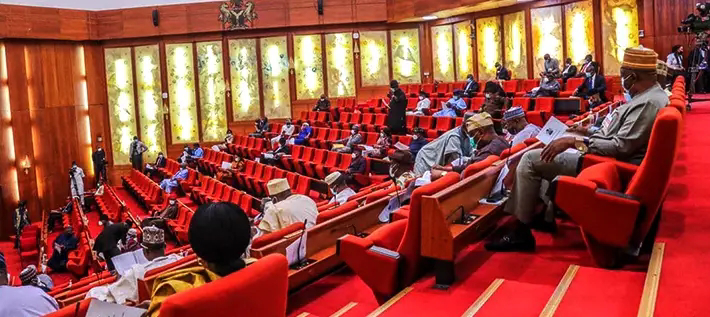The Nigerian Senate has asked the Federal Government to urgently introduce the Nigeria version of the food stamps programme as an interventionist measure to cushion the effects of food insecurity/shortage in the country.
It also asked the government to mandate the federal ministry of agriculture to liaise with development partners and other relevant stakeholders, especially the Lagos Food Bank Initiative, which introduced Temporary Food Assistance Programme, TEFAP, a few years ago.
According to the Upper Chamber, this is with a view to working out practicable templates and implementable modalities for the actualisation of the programme.
Resolutions of the Senate yesterday were sequel to a motion, titled, “Introduction of food stamps in Nigeria as an interim measure to address imminent food insecurity in the country.’’
It was introduced by the Senate Chief Whip, Senator Ali Ndume, APC, Borno South, and co-sponsored by Senator Mustapha Saliu, APC, Kwara Central.
In his presentation of the motion, Ndume noted that at the unveiling of the October 2023 Cadre harmonisé analysis on food insecurity, it was projected that in 2024, Nigeria was expected to see about 26.5 million people grappling with high level food insecurity.
According to him, the reason for the above projection is not far-fetched, as several indicators, which include but not limited to the ongoing conflicts across the country, climate change impacts, escalating inflation witnessed in recent time, and rising costs of both food and essential non-food commodities, due to a fall in the value of naira in exchange market.
He expressed concerns over many hungry and angry Nigerians who had been expressing their frustration and anger over the recent increase in food prices by demonstrating on the streets in several cities across the country.
Ndume said: “In other countries, such as the United States of America, food stamp which is a government-issued coupon that is given to low-income and non-income persons and is redeemable for food has been used since 1933 to date as a measure to cushion the resultant hardships and sufferings on the poor/less privileged as well as low-income earners.
“The Senate notes that at the unveiling of the October 2023 Cadre Harmonisé Analysis on food insecurity, it was projected that in 2024, Nigeria is expected to see about 26.5 million people, grappling with high level of food insecurity.
“It is concerned that the clamour for wage increase and work support cannot alone guarantee a more effective way of addressing food insecurity without the introduction of time-tested public assistance programme, as contemplated by this motion, with particular emphasis on the need for immediate food support across the country,”
In his contribution, Senator Sadiq Umar, APC, Kwara North, who called for the need to ensure that the objective of the motion was achieved, said: “We need to ensure that only those who need it get it and to do that is simple, through the representative of the people, the Senate, governors, down to councillors and that is the political structure.
‘’We also have tested religious structure, traditional structure but most importantly, using of technology can be helpful. We can find a way of getting people’s NIN, their telephone numbers, triangulate it and join it together, so they cannot take advantage of it.”
On his part, Senator Sani Musa, APC, Niger East, said: “The United States of America has used food stamp as one way of reaching out to the downtrodden. I believe that with the right mechanism, we can also adopt the same. “If this system is adopted and I have my stamp which I will present at every strategic location that had been identified for that purpose, I think it will serve the purpose the government is trying to achieve.”
